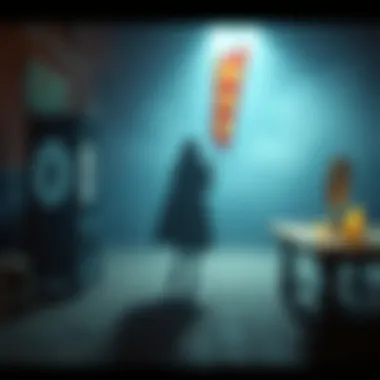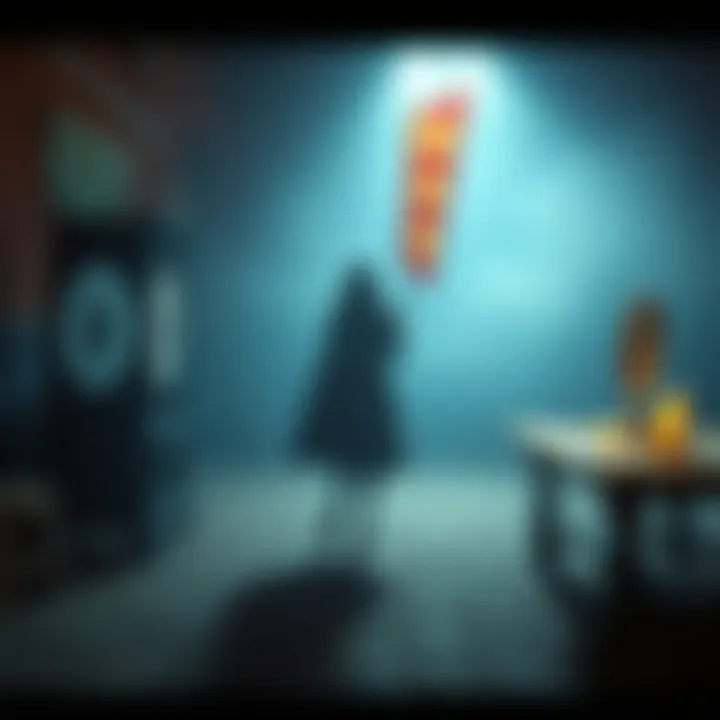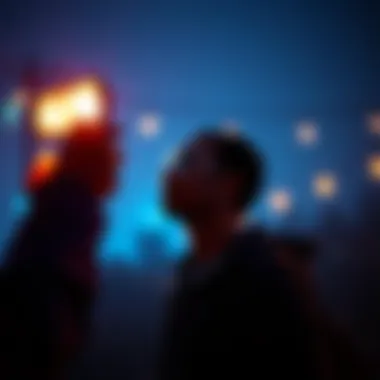Exploring the Dimensions of Psychic Weakness


Intro
As humans, we’ve always been intrigued by the realm of the unseen, the whispers of intuition, and those uncanny moments of knowing something before it happens. This inexplicable facet of existence often leads us to question our own psychic capacities, and more intriguingly, the vulnerabilities that accompany them. The phenomenon of psychic weakness can feel like walking a tightrope between insight and emotional turmoil. Our psychic abilities, while enlightening, can often leave us feeling exposed and fragile.
In this exploration, we’ll navigate the winding paths of psychic sensitivity. We’ll probe into the factors—both psychological and cultural—that contribute to perceptions of weakness in our psychic abilities. Understanding this phenomenon is crucial not only for enhancing our sensitivity but also for managing it in a way that empowers rather than overwhelms.
The following sections will also examine historical perspectives, how mental health intertwines with psychic sensitivity, and practical tips for those wishing to embrace their unique abilities. Grab a cup of tea, settle in, and let’s embark on this insightful journey together.
Defining Psychic Weakness
To truly grasp the intricacies of psychic experiences, one must first thoroughly investigate the notion of psychic weakness. This exploration is not merely academic; rather, it serves as the foundation for a broader understanding of how individuals navigate their own psychic landscapes. Defining psychic weakness is crucial because it touches on the wider implications of self-awareness and sensitivity in a world riddled with diverse energies and influences.
When we talk about psychic weakness, we're referring to the perception of vulnerability within one's own psychic abilities. It suggests that, while some may perceive themselves as strong intuitively, others can feel easily overwhelmed by their experiences, leading to self-doubt and confusion. This topic prompts crucial questions: How do we identify these weaknesses? What external factors contribute to this frailty? And importantly, how do we empower ourselves when faced with these psychic challenges?
Key Considerations:
- Self-Understanding: Recognizing one’s psychic weaknesses can lead to greater self-acceptance and growth.
- Empowerment: Instead of perceiving weaknesses as deficits, individuals can learn to view them as areas for development and mastery.
- Community Awareness: This understanding can foster a sense of belonging among individuals who share similar experiences, breaking down the barriers of solitude often felt by those who perceive their psychic abilities differently.
Origins of the Term
The term "psychic weakness" is not deeply rooted in a single point of origin; rather, it has evolved over time, influenced by various cultural and psychological discourses. Historically, psychic phenomena were often described through the lenses of spirituality and mysticism. Terms like "sensitivity" and "vulnerability" were utilized to convey nuances of human experience and emotional resonance. The notion of weakness, however, began to gain prominence as psychological frameworks started to integrate paranormal concepts into mainstream discussions.
The late 20th century saw an upsurge in interest around psychic phenomena, leading to a blossoming of literature that examined both psychic powers and the potential weaknesses associated with them. There’s a juxtaposition between being viewed as a gifted individual and the internal struggle of coping with heightened sensitivity. The terms surrounding these experiences began reflecting a societal understanding that psychic sensitivity could lead not only to enlightenment but also to an array of challenges that could be labeled as weaknesses.
Common Misconceptions
Several misconceptions often cloud the understanding of psychic weakness, leading to a misalignment between perception and reality. For instance, one common fallacy is that psychic abilities are unequivocally positive traits.
In fact, many individuals who identify as psychically sensitive face significant hardships, such as anxiety, fatigue, and emotional overwhelm. This reality invites a critical analysis of how we frame psychic experiences. The misconception that these sensitivities are merely a blessing often invalidates the genuine struggles many face.
Another prevalent misunderstanding is that psychic weakness equates to a lack of ability. This is fundamentally untrue. Psychic experiences exist on a spectrum, and the challenges faced by those with perceived weaknesses can highlight areas ripe for personal growth and development. Moreover, the idea that one must always be in touch with their psychic side can lead to frustration, making it important to understand that occasional disconnection is both normal and a part of the journey.
"The essence of understanding psychic weakness lies in acknowledging that strength and vulnerability can coexist in our experiences."
By challenging these misconceptions, we can foster a richer dialogue around psychic perceptions. It opens doors to discussions about how both emotional and psychological frameworks play a role in shaping how psychic weaknesses are perceived and managed.
Psychic Sensitivity vs. Psychic Weakness
Understanding the distinction between psychic sensitivity and psychic weakness is crucial for anyone traversing the intricate realms of psychic phenomena. The terms might appear interchangeable at first glance, but they represent unique experiences that merit separate investigations. Unraveling these differences not only enhances self-awareness but also influences how one approaches their own psychic journey. Acknowledging this distinction can empower individuals to harness their sensitivity positively rather than seeing it as a limitation or a burden.
Understanding Psychic Sensitivity
Psychic sensitivity often reflects an enhanced receptivity to the energies and emotions of others. Some people who consider themselves sensitive may feel the emotional weight of a room or pick up on subtle changes in atmosphere when they enter a space. This capacity, while sometimes overwhelming, can also serve as a profound skill. Often, psychic sensitivity manifests through heightened intuition, vivid dreams, or a strong gut feeling about people or situations.
For many individuals, this sensitivity can lead to greater empathy and understanding. They might find themselves relating to others' pain and joy in a deeply personal manner. Think of it like being a finely tuned instrument, able to pick up notes that others cannot hear. However, without proper management and understanding, this gift can also feel like walking through a crowded party with loud music, where every sound clashing together becomes exhausting.
It’s important to remember that acknowledging one’s psychic sensitivity doesn’t automatically mean one will navigate it adeptly. Just as with any skill, it takes time and practice to develop the necessary tools for managing this heightened state.
Distinguishing Weakness in Psychic Ability
While psychic sensitivity is about awareness and receptivity, psychics may experience what is often termed psychic weakness. This perceived weakness often arises when individuals struggle to control their sensitivities or feel overwhelmed by them. One might experience psychic weakness after facing emotional trauma or consistently encountering negative energies in their environment.


For instance, someone who is highly sensitive may become mentally and physically drained after prolonged exposure to chaos or negativity. This is not a sign of failure or ineptitude; instead, it can be indicative of a need for better management strategies or personal boundaries.
A weaker psychic ability might also relate to an individual's emotional state. If someone is grappling with fear or self-doubt, they might find their psychic insights less reliable. It’s a bit like tuning a radio; in a state of distress, the signal may get fuzzy and unclear.
This distinction is vital: recognizing when psychic sensations are more about environmental influences than personal deficiencies is crucial for personal growth.
"Recognizing your strengths and weaknesses in the psychic realm can be like finding your way through a foggy forest. The more you understand your terrain, the easier it becomes to navigate your path."
In essence, understanding the balance between psychic sensitivity and perceived weakness is a dance of self-discovery and acceptance. Through this understanding, individuals can learn to embrace their unique abilities instead of fostering a sense of inadequacy.
Psychological Perspectives on Psychic Weakness
The topic of psychic weakness is multifaceted and intricate, embedding itself deeply within the realms of psychology and human emotion. Diving into psychological perspectives allows for a more profound grasp of how mental processes, emotional states, and societal influences intertwine to shape one's psychic abilities. It sheds light on the balance between natural psychic sensitivity and perceived weaknesses, providing insights that can empower individuals to navigate their unique experiences more effectively.
The Role of Fear and Anxiety
Fear and anxiety often act as significant roadblocks in the realm of psychic ability. When an individual possesses heightened sensitivity to energies and emotions, the pressure to interpret and respond to these stimuli can lead to overwhelming feelings. This is particularly true when the individual is not equipped with coping mechanisms or understanding.
Fear can stem from various sources—be it societal skepticism about psychic phenomena or personal past experiences dismissing their intuitive feelings. This fear can transform into anxiety, rendering it difficult for them to access their psychic gifts. In moments of distress, many opt to shut down these abilities, believing it to be a protective measure.
- Self-doubt often surfaces here, nagging at individuals and convincing them that their abilities are more curse than gift.
- Avoidance behavior becomes common; people may shy away from situations which might challenge their psychic perceptions or amplify their fears.
Understanding this dynamic opens the door for healing. Recognizing that fear can distort one’s perception of their abilities is the first step towards managing it effectively. Embracing that emotional landscape fosters resilience, allowing individuals to transform anxiety into a tool for growth, rather than a hindrance.
"Embracing vulnerability enables a greater connection to the intuitive self. Everyone has fears, yet understanding them is key in conquering psychic hurdles."
Cognitive Dissonance and Psychic Perception
Cognitive dissonance arises when one's experiences conflict with their beliefs or societal norms. For those who experience psychic phenomena, this internal struggle can engender a challenging tension. Consider an individual who has a strong intuitive sense yet feels compelled to dismiss it due to societal rejection and conventional skepticism.
This internal discord can lead to several outcomes:
- Dismissal of psychic experiences: The individual may outright reject their sensitivities, opting instead to conform to a more accepted narrative.
- Intensification of confusion: Rather than fostering a clear understanding of their abilities, this conflict can lead to bewilderment and frustration, diminishing their confidence in what they perceive.
The psychological aspect of such dissonance is significant. Learning to align one’s beliefs with their experiences can effectively mitigate this dissonance. When individuals can accept and affirm their psychic abilities, the internal struggle begins to dissipate. This alignment lays the groundwork for a more empowered sense of self, enabling individuals to cultivate their unique gifts unencumbered by outside skepticism or internal fear.
Emotional Factors Influencing Psychic Weakness
The realm of psychic ability is deeply intertwined with emotions, becoming a double-edged sword in the life of the individual. Emotional Factors Influencing Psychic Weakness are crucial in shaping how one perceives and experiences their own psychic capabilities. When probing the inherent strengths and vulnerabilities of the psychic phenomena, it is essential to acknowledge how emotions not only define these abilities but also can greatly impact their effectiveness. Understanding this interplay is a significant part of unpacking the layers of psychic weakness and resilience.
Impact of Trauma on Psychic Abilities
Trauma, whether emotional or psychological, leaves an indelible mark on an individual's psychic abilities. Often, significant life events create blind spots, dulling one's sensitivity to their surroundings. It is fascinating how a person who has experienced trauma might shield their psychic abilities as a defense mechanism.
A common narrative is that individuals who have faced traumatic experiences often encounter a chilling disconnect from their psychic instincts, leading to feelings of inadequacy. An example might be a person who, after experiencing a severe loss, suddenly finds their intuition clouded, making them second-guess their once-clear gut feelings. More so, those who have been through emotional upheavals might find that their heightened empathy turns into emotional overwhelm, thus limiting their psychic reach.
Moreover, trauma can introduce a cycle of negative thinking, leading individuals to doubt their perceptions and insights.
"The scariest thing is not the unknown but the shadows of our past that prevent us from moving forward."
To heal and restore these psychic faculties, individuals often engage in therapeutic practices or support systems that foster healing. Techniques such as journaling, talking to trusted friends or family, and seeking professional help can contribute greatly to rebuilding one's openness to intuitive insights.
Emotional Resilience and Sensitivity


The concept of emotional resilience is central to understanding psychic weakness. Those who possess emotional resilience can better navigate the bumps in their psychic journey. It’s the ability to bounce back from negative experiences, making them not just survivors but thrivers in the psychic domain.
A person with strong emotional resilience often uses their sensitivity as a guiding compass rather than a burden. For instance, they may recognize their heightened emotional awareness as a tool to enhance their psychic intuition rather than feel overwhelmed by it. In practice, this means embracing their sensitivities instead of running away from them, recognizing that feelings often hold the keys to deeper insights. Seen through this lens, sensitivity transforms into an asset that enriches the psychic experience.
Conversely, those with lower emotional resilience may find that their psychic sensitivity becomes a source of distress. It manifests in situations where they may feel vulnerable in crowded places, or overly affected by others' emotions, potentially leading to psychic burnout. Yet, cultivating emotional resilience can shift this dynamic. Practices like mindfulness meditation, grounding exercises, or even engaging in creative expression can bolster one’s capacity to handle emotional currents more expertly.
Ultimately, emotional factors outline a spectrum where psychic weakness can either loom large or shrink into insignificance, depending largely on how individuals manage their emotional landscape.
Societal and Cultural Influences
The exploration of psychic weakness cannot be divorced from its societal and cultural context. The perceptions and beliefs surrounding psychic abilities are deeply woven into the fabric of various cultures, influencing how individuals experience and express their psychic sensitivity or weaknesses. Understanding these influences can provide valuable insights for those who feel overwhelmed or challenged by their own psychic experiences.
Historical Context of Psychic Phenomena
Throughout history, different societies have had distinct approaches to psychic phenomena. In ancient civilizations, such as the Egyptians and the Greeks, psychic or prophetic abilities were often revered and integrated into societal practices. Oracles, for instance, held significant power, guiding decisions on matters of state and personal fortune. The historical reverence suggests that in earlier times, having psychic abilities was often seen as a badge of honor rather than a weakness.
However, as societies evolved, so did the attitudes toward psychic phenomena. During the Enlightenment era, the rise of rationalism and empirical science led to skepticism regarding non-physical phenomena. Skeptics labeled psychic abilities as superstition, resulting in a cultural shift that often stigmatized those who claimed such experiences. This historical backlash contributes to modern-day misunderstandings about psychic weakness, leading individuals to feel isolated in their experiences. Thus, the historical context shapes contemporary views, creating a dual narrative where psychic prowess can be both celebrated and dismissed.
Cultural Receptivity to Psychic Abilities
Cultural receptivity plays a pivotal role in how individuals respond to their psychic abilities. In countries like India, where spirituality and psychic practices are deeply embedded in social customs and religious practices, individuals may find greater acceptance and understanding of their psychic sensitivities. Alternatively, in more secular cultures, people might grapple with skepticism, which can exacerbate feelings of psychic weakness.
Moreover, media portrayal of psychics also influences societal attitudes. Mainstream representations, whether in films or television series, often dramatize psychic abilities, contributing to a misunderstanding that these experiences are purely fantastical. For many gamers and fans of rich narratives, this can also impact their engagement with their own psychic experiences, leading to disillusionment when real-life experiences don't match up to cinematic representations.
"Cultural beliefs shape the landscape in which psychic experiences unfold, determining whether they are embraced or shunned."
Techniques for Managing Psychic Weakness
The exploration of psychic weakness reveals an intriguing tapestry of experiences and sensitivities. However, to effectively navigate this complex landscape, it's vital to equip oneself with techniques that foster stability and strength. Just like a gamer strategizing for a tough level, managing psychic vulnerability requires a toolkit of practical approaches that individuals can use in their daily lives. The importance of these techniques lies in their ability to instill a sense of control, build emotional resilience, and promote overall well-being.
Grounding and Centering Practices
Grounding techniques serve as a foundational practice for individuals seeking to manage their psychic sensitivities. At its core, grounding is all about connecting back to the physical body and the present moment. It helps to clear the mind of clutter and reduce anxiety by anchoring oneself in the here and now.
Here are a few effective grounding practices:
- Nature Walks: Spending time in nature can be rejuvenating. Feel the earth beneath your feet and the wind against your skin. This connection to the natural world can provide a refreshing reset.
- Breathing Exercises: Simple deep breathing can work wonders. Inhale slowly, counting to four, hold for a moment, and exhale gently. Repeat this several times to calm the nervous system.
- Visualization Techniques: Picture yourself surrounded by a protective barrier of light. This imagery can create a sense of safety and help in shielding against overwhelming energies.
Adopting these practices regularly can significantly enhance one’s ability to navigate the tumultuous waters of psychic awareness. As many individuals have observed, grounding acts like a strong compass pointing one back to their center.
Mindfulness and Meditation Techniques
Embracing mindfulness can play a pivotal role in managing psychic weakness. Mindfulness is the practice of maintaining a moment-by-moment awareness of thoughts, feelings, bodily sensations, and the surrounding environment. It allows a person to observe their sensations without becoming overwhelmed by them.
Consider incorporating the following into your routine:
- Daily Mindfulness Meditations: Taking just fifteen minutes daily to sit quietly and observe thoughts can heighten awareness of psychic sensations while allowing them to flow without panic.
- Body Scan Exercise: This technique involves mentally scanning one’s body for tension and releasing it. Starting from the toes and moving upwards, acknowledging each part promotes relaxation.
- Gratitude Practice: Each evening, write down three things you are grateful for. This shifts focus away from negative experiences, fostering a positive outlook.
Many individuals find that with consistent practice, mindfulness enables them to respond more calmly to psychic challenges, reducing feelings of weakness and enhancing clarity.
Seeking Professional Guidance


Sometimes, the complexities of psychic experiences can be isolating. Seeking professional guidance, whether from therapists, life coaches, or psychic mentors, can provide invaluable support. These experts can offer personalized tools and insights that help to navigate one’s psychic landscape.
Here are a few considerations when seeking guidance:
- Find the Right Fit: Whether it’s a psychologist experienced in psychic phenomena or a life coach specializing in spiritual matters, it’s essential to choose someone whose philosophy resonates with your experiences.
- Explore Online Forums: Platforms like Reddit and specialized Facebook groups can connect individuals with shared experiences, offering communities where advice and support are abundant.
- Workshop Participation: Attending workshops or classes can be an excellent way to engage with like-minded individuals and learn practical techniques for self-management.
Engaging with professionals offers not just coping strategies but also the assurance that one’s experiences are valid and shared by others. It enriches the journey of understanding one's psychic self, allowing for deeper exploration and acceptance.
Personal Narratives and Case Studies
Personal narratives and case studies play a significant role in the exploration of psychic weakness. They serve as profound windows into the lived experiences of individuals grappling with their psychic abilities, or in some cases, their perceived deficiencies in these areas. By delving into these stories, readers can find a resemblance to their own concerns, fostering a sense of connection and understanding.
The value of exploring personal narratives lies in their capacity to humanize complex subjects. Each account offers a glimpse into individual struggles, successes, and transformations. They highlight how people navigate the often murky waters of psychic sensitivity—learning to distinguish between feeling overwhelmed and being attuned to their surroundings. Here are some specific elements to consider regarding the importance of these narratives:
- Real-Life Context: Understanding that psychic experiences vary widely among individuals can ease feelings of isolation. A shared narrative can provide comfort, as others reflect similar experiences.
- Learning from Others: Insights from case studies can illuminate effective strategies for coping with psychic weakness. What works for one may inspire another to try new methods or practices.
- Validation of Experiences: Personal stories can serve as validation for those who might feel their experiences are dismissed or misunderstood. A relatable journey can affirm that their feelings are legitimate.
- Encouragement and Hope: Hearing about someone struggling but ultimately finding their way can offer tangible hope. It reminds readers that journeys through psychic challenges may not define them eternally.
The thoughtful compilation of these narratives fosters a richer discussion about psychic weakness, emphasizing that it is not merely a deficit but a part of a broader human experience.
Experiences of Individuals with Psychic Weakness
Many individuals have shared their encounters with psychic weakness, describing moments of acute sensitivity that left them feeling vulnerable and out of control. For instance, a woman named Sara might speak about how her heightened emotional awareness made social interactions exhausting. "Every time I walked into a crowded room, it felt like I was hit by a wave of energy – it was overwhelming," she noted.
Another individual, Mike, recounts having premonitions that would often come true, but the burden of knowing sometimes hindered him. "I’d see events unfolding before they happened, yet I could not always warn those involved. It ate away at me," he expressed. Such experiences underscore the unique challenges faced by those who feel that their psychic sensitivity more often serves as a source of weakness rather than empowerment.
Comparative Analysis of Competent vs. Weak Psychics
The distinction between competent and weak psychics can be quite illuminating. Competent psychics often exhibit a refined ability to control their sensitivity, whereas those perceived as weak may struggle with it. This comparison highlights not only differences in skill but also the psychological and emotional underpinning of their experiences.
- Competent Psychics: They might have developed practices that enhance their abilities while managing their weaknesses. For example, they often utilize grounding techniques or engage in regular meditation, allowing them to maintain a healthy balance between their sensitivity to other energies and their personal well-being.
- Weak Psychics: Conversely, individuals categorized as weak may face challenges, such as anxiety or fear, that inhibit their growth. They might feel engulfed by the experiences rather than empowered by them. As a result, their psychic sensitivity can translate into a sense of burden rather than a gift.
The dialogue surrounding these experiences is crucial. By examining the differences between those who thrive in their psychic abilities and those who feel stifled by them, we gain critical insights into the paths individuals might take to navigate their psychic landscapes.
Understanding these narratives and analyses can assist many in recognizing their own truths and challenges. Engaging deeply with these stories fosters a sense of community among those who may, at times, feel like outliers in their psychic experiences. For more resources on psychic abilities, consider visiting Wikipedia on psychic phenomena or related discussions on platforms like Reddit or Facebook groups.
By embracing these personal journeys, we pave the way for a richer understanding of psychic weakness, transforming what can often feel like a burden into a deeply nuanced aspect of the human experience.
The Future of Understanding Psychic Weakness
As we navigate the increasingly complex interface between psychology and the paranormal, looking towards the future of understanding psychic weakness is not just timely, it's essential. The exploration of this topic embraces a broader vision toward potential breakthroughs in comprehending not just psychic phenomena, but also the human experience in its entirety. Addressing how psychic vulnerabilities can shape individual identities and perceptions of reality can bring about numerous benefits, from self-awareness to holistic healing.
In this unfolding narrative, we examine critical elements, potential benefits, and the myriad considerations regarding the future study of psychic weakness.
Emerging Research in Psychology and Paranormal Studies
Research into psychic phenomena has, until relatively recently, been overshadowed by skepticism in both scientific circles and popular culture. However, emerging studies are beginning to illuminate the ways psychological frameworks can better accommodate individuals who experience pronounced psychic sensitivities or weaknesses.
- Interdisciplinary Collaborations: Universities and research institutions are increasingly opening their doors to interdisciplinary collaborations, combining psychology with the study of paranormal events. Researchers from these disciplines are discovering that what was once deemed anecdotal can often have objective markers worthy of study.
- Novel Research Methodologies: New methodologies, such as the incorporation of quantitative measures alongside qualitative analyses, are emerging. Techniques such as electroencephalograms or functional MRI scans applied during psychic tasks could provide fresh insights into brain activity under those circumstances.
- Holistic Perspectives: Considering the psychological aspects, emotional factors, and sociocultural contexts around psychic phenomena can yield a multi-faceted understanding that goes beyond traditional studies. Such a holistic view could demystify psychic vulnerabilities and open new avenues for therapeutic interventions.
Expect to see research that welcomes individuals’ experiences, building rapport between scientists and participants to minimize stigmatization. This can lead to increased confidence among those who feel their psychic vulnerabilities are a part of their identity.
Expanding the Dialogue on Psychic Phenomena
The dialogue surrounding psychic phenomena is crucial—not only to academics but also to individuals navigating their own unique experiences. Expanding this conversation can pave the way for greater acceptance and understanding.
- Community Involvement: Fostering a sense of community among those who identify as psychics or sensitive individuals promotes a supportive network. Online platforms like Reddit and Facebook groups can function as informal support systems, where personal stories and expert knowledge are shared freely.
- Platforms for Voicing Experiences: Scientific conferences, public forums, or workshops can encourage individuals to share their experiences in a safe environment. This not only validates personal experiences of psychic weakness but can also create pathways for collaboration between psychic practitioners and mental health professionals.
- Educational Initiatives: As the conversation broadens, educational institutions might consider incorporating courses on psychic phenomena into their curricula. Such classes could dissect both historical and cultural contexts, developing critical thinking about what psychic abilities could mean for individuals and society as a whole.
Ultimately, expanding the dialogue on psychic phenomena invites the cautious skeptic and the ardent believer to sit at the same table, fostering an atmosphere of mutual respect and exploration.
In its essence, the future of understanding psychic weakness lies in our willingness to dissect, discuss, and delve into the unknown with an open mind. By prioritizing research and collaboration, we lay the groundwork for a richer comprehension of psychic experiences and their rightful place within human consciousness.



